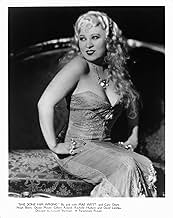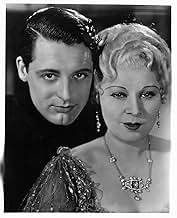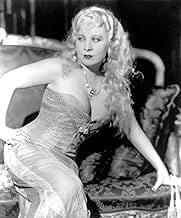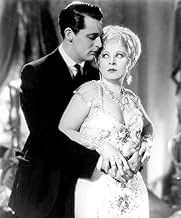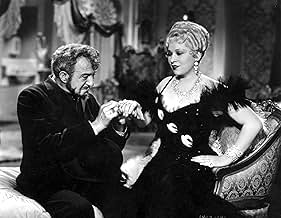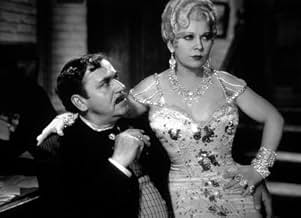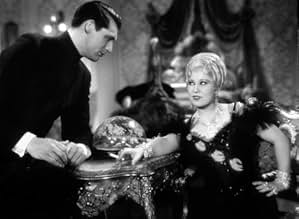AVALIAÇÃO DA IMDb
6,3/10
7,5 mil
SUA AVALIAÇÃO
Na década de 1890 na cidade de Nova York, uma cantora de um clube noturno seduz vários pretendentes, mas seu antigo namorado escapa da prisão, e ela se apaixona por um agente da lei.Na década de 1890 na cidade de Nova York, uma cantora de um clube noturno seduz vários pretendentes, mas seu antigo namorado escapa da prisão, e ela se apaixona por um agente da lei.Na década de 1890 na cidade de Nova York, uma cantora de um clube noturno seduz vários pretendentes, mas seu antigo namorado escapa da prisão, e ela se apaixona por um agente da lei.
- Direção
- Roteiristas
- Artistas
- Indicado a 1 Oscar
- 5 vitórias e 1 indicação no total
Noah Beery
- Gus Jordan
- (as Noah Beery Sr.)
Robert Homans
- Doheney
- (as Robert E. Homans)
Ernie Adams
- Man in Audience
- (não creditado)
Billy Bletcher
- Singing Waiter
- (não creditado)
Wade Boteler
- Dan's Pal
- (não creditado)
Jack Carr
- Patron Who Hits His Girl
- (não creditado)
- Direção
- Roteiristas
- Elenco e equipe completos
- Produção, bilheteria e muito mais no IMDbPro
Avaliações em destaque
It appears that some modern day critics have forgotten what a great period film is all about. This very authentic replica of the Gay Nineties (1890s) is accurate right down to the horse hair furniture, gas lamps, Brooklyn accents and costumes. It was adapted from Mae West's Broadway hit "Diamond Lil" and coupled with West's other 1933 hit (I'm No Angel), saved Paramount from bankruptcy. The film was so loved by audiences that midnight showings were needed to accommodate the crowds, and it was so lurid that seven countries banned the film altogether. It was nominated for the best picture of 1933 and was West's favorite of all her twelve films. The film introduced the famed line (although it's uttered slightly different in the movie) "Come up and see me sometime." Some of Mae's funniest work is here, and she sings three great tunes. Edith Head did all the costumes and Lowell Sherman directed. Modern times have dulled the bluntness of this film, but be assured, it was an eye-popper in 1933.
Mae West had a Broadway smash when she penned the bawdy tale of DIAMOND LIL for herself--and with a few tweaks here and there the story came to the screen as SHE DONE HIM WRONG. The film was an immediate hit and the role of Lady Lou remains one of West's best remembered performances. The script is jam-packed with some of West's most famous lines, including the memorable "Come up'n see me sometime. I'm home every evenin'" and "You can be had." West throws her lines with style, aplomb, enough innuendo to make a censor cringe, and considerable humor--but, somewhat surprisingly, the movie is not really a comedy.
SHE DONE HIM WRONG is a hard-knocks tale of Bowery bruisers who dance attendance upon the 'Lady Lou' and often resort to crime to keep her dripping in the diamonds she prizes above all else. But although she has one lover already locked up in jail, another one mixed up in the white slavery rackets, and still a third waiting to step into the gap, the Lady Lou is more interested in seducing missionary Cary Grant... only to find him less interested in her body than her soul, a circumstance that prompts West to utter one of the most how-did-that-get-past-the-censors lines in 1930s cinema: "Maybe I ain't got no soul." This is a surprisingly tough little movie, and in addition to West's zinging lines and occasional musical numbers SHE DONE HIM WRONG also offers a glimpse at a very young (and still slightly wooden) Cary Grant; it also has an ensemble cast that plays in a very enjoyable grand manner, truly first rate production values all the way, and A surprisingly brisk running time. West did funnier films than this, but the mix of her sharp wit and the rough story is particularly memorable. This is where the fire started really started, and I recommend it very strongly.
Gary F. Taylor, aka GFT, Amazon Reviewer
SHE DONE HIM WRONG is a hard-knocks tale of Bowery bruisers who dance attendance upon the 'Lady Lou' and often resort to crime to keep her dripping in the diamonds she prizes above all else. But although she has one lover already locked up in jail, another one mixed up in the white slavery rackets, and still a third waiting to step into the gap, the Lady Lou is more interested in seducing missionary Cary Grant... only to find him less interested in her body than her soul, a circumstance that prompts West to utter one of the most how-did-that-get-past-the-censors lines in 1930s cinema: "Maybe I ain't got no soul." This is a surprisingly tough little movie, and in addition to West's zinging lines and occasional musical numbers SHE DONE HIM WRONG also offers a glimpse at a very young (and still slightly wooden) Cary Grant; it also has an ensemble cast that plays in a very enjoyable grand manner, truly first rate production values all the way, and A surprisingly brisk running time. West did funnier films than this, but the mix of her sharp wit and the rough story is particularly memorable. This is where the fire started really started, and I recommend it very strongly.
Gary F. Taylor, aka GFT, Amazon Reviewer
After a supporting role in the George Raft film Night After Night, Paramount films realized what a gold mine they had in Mae West. Between her and a young radio singer named Bing Crosby, they pulled Paramount from the brink of bankruptcy, the white mountain studio nearly went under in the early Thirties.
After this the studio gave Mae her head in choosing material and she decided to use one of her own original plays, She Done Him Wrong. The story is set in the Bowery district of the 1890s and New York of the 1890s is where Mae grew up, she had a good ear and a good memory for character types she uses in the film.
Mae always plays Mae West and would you really want her as anyone else? She's a Bowery entertainer of the period, working in this case for Noah Beery's club as the main attraction. Beery's into some really shady business, he doubles in white slavery and nearly gets innocent Rochelle Hudson who tries to kill herself in his club. Mae saves her, but turns her over to Beery because she doesn't know about his other sideline. All she knows is that he pays off in diamonds as well as cash.
Besides Beery panting after her, we've got silent screen star Owen Moore, young Gilbert Roland who is the assistant to white slaver Rafaela Ottiana and in the film that would be his breakthrough, Cary Grant as a Salvation Army worker who's not all he seems. Mae personally picked Grant for his role, he was a young Paramount contract player beginning to get some notice. But as I said before in my review of I'm No Angel, this is not a Cary Grant film, this is a Mae West film.
Mae besides being one of the great sex symbols of the last century had a great memory and eye for detail of the bawdy Bowery of her youth. Good thing she came along before The Code was put in place. Her first films are her best, The Code definitely hampered her style.
And Mae West if she had anything, had style.
After this the studio gave Mae her head in choosing material and she decided to use one of her own original plays, She Done Him Wrong. The story is set in the Bowery district of the 1890s and New York of the 1890s is where Mae grew up, she had a good ear and a good memory for character types she uses in the film.
Mae always plays Mae West and would you really want her as anyone else? She's a Bowery entertainer of the period, working in this case for Noah Beery's club as the main attraction. Beery's into some really shady business, he doubles in white slavery and nearly gets innocent Rochelle Hudson who tries to kill herself in his club. Mae saves her, but turns her over to Beery because she doesn't know about his other sideline. All she knows is that he pays off in diamonds as well as cash.
Besides Beery panting after her, we've got silent screen star Owen Moore, young Gilbert Roland who is the assistant to white slaver Rafaela Ottiana and in the film that would be his breakthrough, Cary Grant as a Salvation Army worker who's not all he seems. Mae personally picked Grant for his role, he was a young Paramount contract player beginning to get some notice. But as I said before in my review of I'm No Angel, this is not a Cary Grant film, this is a Mae West film.
Mae besides being one of the great sex symbols of the last century had a great memory and eye for detail of the bawdy Bowery of her youth. Good thing she came along before The Code was put in place. Her first films are her best, The Code definitely hampered her style.
And Mae West if she had anything, had style.
Mae West is another one of those actresses that played the same role time after time. She played Mae West. What distinguishes the movies are the lines and she was a masterful created of double entendre with a big load of sex. She would surround herself with the actors of the day, like Gilbert Roland and Wallace Beery. The one that benefited the most here was Cary Grant. It's hard to realize that he goes back so far. I have to admit that for mot of my life I found West's thing to be off handed and tiresome. But now I know that she had great timing and and interesting stage presence. She could deliver a "dirty" line like no other. This gave us the famous like, "Come up and see me sometime."
Mae West was a veteran of burlesque, vaudeville and the Broadway stage by the time she made her first film in 1932 at the age of 39. `She Done Him Wrong' was her second film and her first starring role in an adaptation of her smash Broadway hit `Diamond Lil'. It was a play that West had written herself and it played to packed houses on Broadway for years. This film was nominated for an Academy Award for best picture and made Cary Grant into an instant star. Mae went on to write nine of the fourteen screenplays for films in which she was to star. Thus, all those great quotes we've heard that are attributed to her were not only said by her, but written by her as well. By 1935, she was the most highly paid woman in America. To this day, she remains one of the female stars most often imitated by female impersonators.
This film is among her best. It is full of the bawdy double entendre that became her trademark. She was the queen of sexual innuendo and suggestive dialogue and many of her lines have become part of Americana (e.g. `Is that a gun in your pocket or are you just glad to see me?' And, `A hard man is good to find.' And of course, `Come up and see me sometime.')
The plot of this film is simplistic and it is clearly a vehicle for her enormous talent, leading up to the now famous proposal by Cary Grant at the end of the film. Mae commands every frame of the film with her incomparable combination of sex appeal and ribald humor. Her sense of comic timing is impeccable making the funny lines she writes that much more hilarious by the snide way in which she delivers them.
Before this film, Cary Grant had appeared in half a dozen films and was building a reputation as a solid actor. However, none of his early films gave him the exposure that this film did due to its wild popularity at the time. West handpicked him for the part saying that he combined virility with the bearing of a gentleman. She wanted someone who would epitomize the now famous line, `Hello, warm, dark and handsome.' Though his role in this film is minor compared to West's, it made him a household name and a bankable star.
This classic film is a piece of film history that shouldn't be missed. I rated it a 10/10. It is among Mae West's best moments. I highly recommend it.
This film is among her best. It is full of the bawdy double entendre that became her trademark. She was the queen of sexual innuendo and suggestive dialogue and many of her lines have become part of Americana (e.g. `Is that a gun in your pocket or are you just glad to see me?' And, `A hard man is good to find.' And of course, `Come up and see me sometime.')
The plot of this film is simplistic and it is clearly a vehicle for her enormous talent, leading up to the now famous proposal by Cary Grant at the end of the film. Mae commands every frame of the film with her incomparable combination of sex appeal and ribald humor. Her sense of comic timing is impeccable making the funny lines she writes that much more hilarious by the snide way in which she delivers them.
Before this film, Cary Grant had appeared in half a dozen films and was building a reputation as a solid actor. However, none of his early films gave him the exposure that this film did due to its wild popularity at the time. West handpicked him for the part saying that he combined virility with the bearing of a gentleman. She wanted someone who would epitomize the now famous line, `Hello, warm, dark and handsome.' Though his role in this film is minor compared to West's, it made him a household name and a bankable star.
This classic film is a piece of film history that shouldn't be missed. I rated it a 10/10. It is among Mae West's best moments. I highly recommend it.
Você sabia?
- CuriosidadesThe National Legion of Decency was formed in October of 1933, six months after the release of this film. Legion officials cited Mae West and the film as one of the major reasons for the "necessity" of the organization.
- Erros de gravaçãoShadow of camera moves against the back wall of Lady Lou's apartment while she and Sally are talking.
- Versões alternativasMaryland, Massachusetts, New York, Ohio, and Pennsylvania removed the song "A Guy What Takes His Time". Will H. Hays and Adolph Zukor went to New York to edit the song to an entrance by Mae West, one opening verse, and one closing verse to lessen the suggestiveness. Despite this, Ohio and Pennsylvania cut all of West's one liners.
- ConexõesFeatured in The Twentieth Century: The Movies Learn to Talk (1959)
Principais escolhas
Faça login para avaliar e ver a lista de recomendações personalizadas
- How long is She Done Him Wrong?Fornecido pela Alexa
Detalhes
- Data de lançamento
- País de origem
- Idioma
- Também conhecido como
- Nació para pecar
- Locações de filme
- Empresa de produção
- Consulte mais créditos da empresa na IMDbPro
Bilheteria
- Orçamento
- US$ 200.000 (estimativa)
- Tempo de duração
- 1 h 6 min(66 min)
- Cor
- Proporção
- 1.37 : 1
Contribua para esta página
Sugerir uma alteração ou adicionar conteúdo ausente


